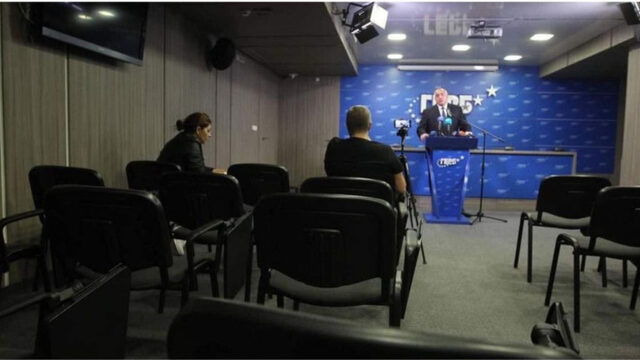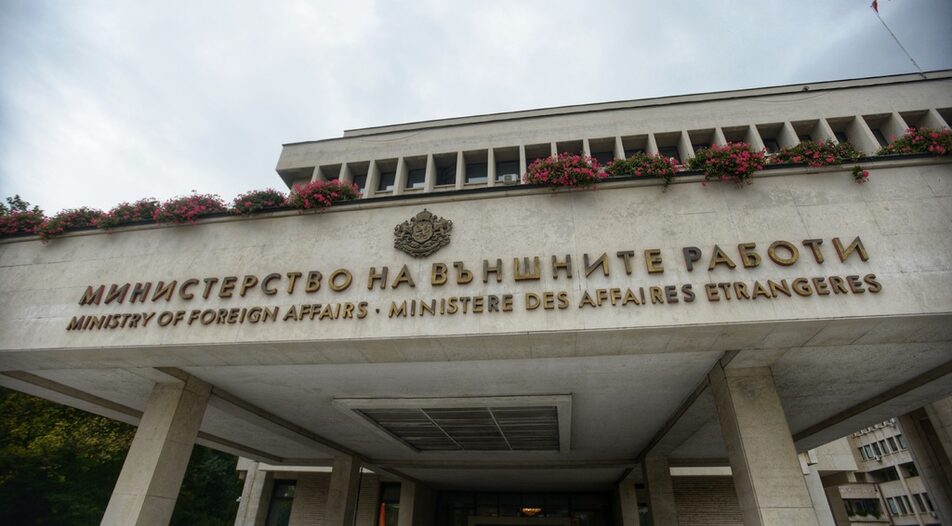No more golden passports. That's what the new parliament decided in one of its first votes.
It has been long overdue, to be honest. The scheme for getting a Bulgarian passport in exchange for investment was riddled with problems and massive corruption from the outset. Also, what made anyone think this was a good idea in the first place?
To open the doors to one of the EU's most corrupt nations in the EU and cede the prized possession of citizenship in exchange for something that can be as ephemeral as an Excel sheet, seems like heaven for behind-the-scenes power-brokers.
And it was, as the US pointed out (since no Bulgarian authority dared to do so).
In the end, it turns out that 103 people won citizenship through this scheme. Over 40% of them are, no surprise, Russians. 20 are from the Middle East. Now, an investigation is underway to determine if all the "lucky" beneficiaries (or indeed, any of them) actually made lasting investments that merited the citizenship they acquired. Since Capital Weekly have been investigating this in the past, I can help: probably most of them haven't.
Suffice to say, it was enough to even invest in bonds or stocks in a company listed on the Bulgarian stock exchange, in order to pass the threshold of 1 million levs. Remember, bonds and stocks can be bought and sold. Unlike citizenship.
Since tensions with Russia are so high at the moment, this seems like the right time to investigate whether Bulgaria has been operating as a back door to the Union for some high-level functionaries of Putin. It might also help to ease our way into Schengen and the US visa waiver.
Yet this must also serve as a turning point for the new government: it says it wants to attract FDI and plans to make Bulgaria a magnet for investors. Some have protested that ending the "golden" scheme will backfire financially. Yet it has been open for quite some time and we didn't benefit a lot. Just maybe - is this a revolutionary concept? - you don't need to sell passports in order to attract good investors.
This newsletter was helped by
POLITICS THIS WEEK
Boyko, Borislava, Barcelona
Another week, another scandal. This time a somewhat forgotten affair caught up with former Prime Minister and GERB leader Boyko Borissov - the so-called Barcelonagate - the one about him allegedly being investigated by Spanish police for participating in a money laundering scheme to buy his supposed mistress, model Borislava Yovcheva, who may or may not have had his child, a house in the Catalan capital.
The first announcements coincided (luckily for Mr Borissov) with the start of the Covid pandemic in February 2020, so the whole story seemed to have tanked. Until earlier this week when members of the new cabinet announced they had received a 29-page report from the Spanish authorities claiming that the investigation has indeed been up and running and that, yes, Mr Borissov might really be implicated.
Sic transit gloria mundi
This led to one the saddest damage control efforts in recent history - even sadder than the post-elections scene of Mr Borissov in front of his jeep.

In his signature monologish style he stood up in an empty press-conference room and denied all accusations to an audience consisting of his two PRs and zero journalists. He had been to Spain, Borissov said - to receive a medal from the Spanish authorities in Alicante, in front of a 50 thousand strong crowd (unclear if they were there just to cheer him). And, of course, he doesn't own a house in Barcelona, nor does he have a mistress there.
More tensions between Petkov and Radev
The president criticized the PM Kiril Petkov for a second time in a month, this time - over alleged inaction over the energy price crisis. "The time for analysis is over, we are waiting for results," the President said on Thursday. Mr Radev has voiced dissatisfaction with the Prime Minister's actions three times already - the last time over the rushed new appointments of new members of the Energy and Water regulator and Bulgargaz, and once more over Mr Petkov's alleged policy of appeasement vis-a-vis Skopje.
BSP joins the stampede
To top it off, one of the coalition partners of Mr Petkov - the Bulgarian Socialist Party - insisted Petkov should not write off the Belene Nuclear Power Plant project - something he already did twice this year.
Shh! Don't mention the war!
it appears that the Bulgarian military, which has been modernizing mostly on paper in the past, is finally getting some attention - the cabinet announced a 200 million BGN investment in the modernization of our T-72 tanks and the armored vehicles of the mobile infantry, as well as its intention to raise its annual military spending to 2 percent of GDP as of next year. It must be noted that the same intention has been mentioned several times before. Yet President Radev, when convening the national leaders to discuss the topic, made sure to never mention the reason all of this is done.ECONOMY
More money from the budget for science, farmers, taxis
Parliament proposed changes between the two readings of the State Budget Act for 2022 that basically allocate more money to almost all the institutions that have threatened protests. These include the Bulgarian Academy of Sciences, museum workers, farmers, and taxis. At the same time, the state reduced its spending on the prosecutor's office and compensations for layoffs of government officials.
Trains!
This is what Bulgaria will spend its transport money from the Recovery and Resilience plan, it seems. The new minister Nickolay Sabev (ex-owner of Econt couriers) seems to be intent on working for the development of rail transport, and has rewritten the entire chapter of the plan. Bulgaria will spend 400 million levs or 200 million euro on getting new trains for intercity rail, as well as high-speed inter-city trains. Where they will operate, however, is another story.
Figures
4.5%
Is the increase in Bulgaria's GDP in the fourth quarter of 2021 year-on-year. The Bulgarian economy has grown by a slightly lower rate than the EU average of 4.8% according to Eurostat's preliminary data. For the whole of 2021, Bulgaria's nominal GDP reached 133 billion levs.
9.1%
Is the annual inflation in January 2022 compared to the same period in 2021, reported NSI.
1676 levs or 857 euro
Is the average gross salary in the country for 2021, according to data from the National Statistics Institute (NSI). The average salary in the public sector continues to grow faster than the average salary in the private sector. Thus, at the end of the fourth quarter, it reached 1 775 levs or 217 above the average salary of workers in the rest of the economy.
67.9 billion levs
Is the total value of all exported Bulgarian goods to third countries and the EU in 2021. This is up 24% compared to 2020. At the same time, the total value of all imported goods from third countries and the EU amounted to 76.6 billion levs and grew by 27.5%
BUSINESS
Retail
FantasticoThe store chain will invest nearly 85 million levs in several strategic projects in 2022-2023. The company plans to install solar panels on the roofs of its larger retail stores in order to produce its own green energy. The total power of the photovoltaic systems will be 3600 - 3800 kW.
Telecoms
UnitedThe telecom group has abandoned a planned deal to acquire a majority stake of 51% in the Bulgarian telecommunication company Telelink Business Services Group. However, Telelink still plans to change its majority owner.
ENERGY
We will replace coal with batteries
That's the new plan, as set out in the Recovery and Resilience Package. Bulgaria will install 6000 MWh worth of batteries in the grid, which is supposed to help the transition from coal powered system to one of "produce-save" cycle. This, it seems, is the alternative the new government is going to propose to Brussels in order to save the state coal Maritza Iztok complex a bit longer.
BRUSSELS
- The European Data Protection Supervisor (EDPS) has called for a complete ban on the controversial Pegasus spyware in the EU. The organization's report states: "Highly developed military-grade spyware such as Pegasus has the potential to cause unprecedented risks and damage not only to fundamental freedoms but also to democracy and the rule of law".
- Brussels can now freeze the money for the Member states in the event of problems with the rule of law (Recovery and Cohesion funds). Following the decision of the EU Supreme Court, the first victims of the conditionality mechanism are expected to be Poland and Hungary.
WATCH OUT FOR
People
Stefan Yanev - the Defense Minister has the difficult task of renegotiating the parameters of the deal for the F-16s Bulgaria was supposed to receive from the US next year, but would likely get two years from now - at the earliest. Maybe Mr Yanev would be able to broker some second-hand equipment for the Bulgarian military in return for the delay (read more about it here).
Albert Popov - the skier has just scored the highest ever position of a Bulgarian in the slalom in an Olympic competition, finishing 9th.
Place:Plovdiv ranked fourth in the "Best European Destination" ranking for 2022. Yet it was ranked first in Romantic destinations, Wine and Culture.
Word of the week: Дамаджана (Plastic Carboys)
There is a saying in Bulgarian that one should always be wary of drinking from unmarked water bottles, as they might contain some other, more highly-spirited liquid than water. In a modern twist to a centuries-old tradition of distilling and bottling their own homemade rakia, Bulgarians started using the cheap and easy to obtain plastic bottles instead of the old school glass ones.
We were reminded of this common wisdom at the end of last week, when the news broke in Plovdiv that a person complained that he bought a bottle of water, only to find rakia inside once he tried it. An internal inquiry by shop owners uncovered ten faux water bottles filled with "fine, soft and smooth" rakia. What makes the story even more amusing is the fact that the gentleman who complained was the only one to do so - some other clients who smelled the difference actually returned to buy more of the "water" bottles.
You can never have too much of a good thin, especially in times of inflation. Have a good and smooth weekend !
No more golden passports. That's what the new parliament decided in one of its first votes.
It has been long overdue, to be honest. The scheme for getting a Bulgarian passport in exchange for investment was riddled with problems and massive corruption from the outset. Also, what made anyone think this was a good idea in the first place?












